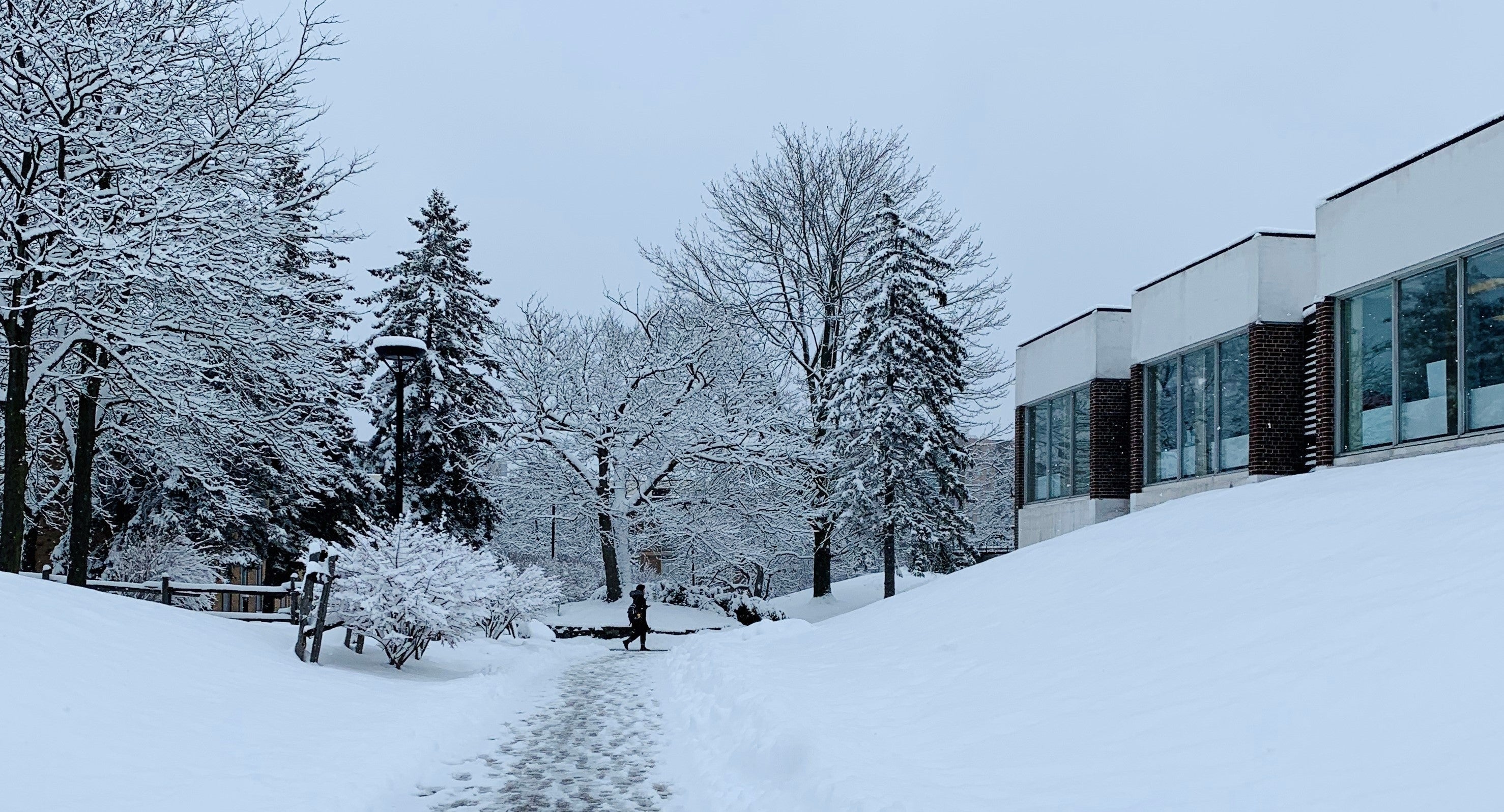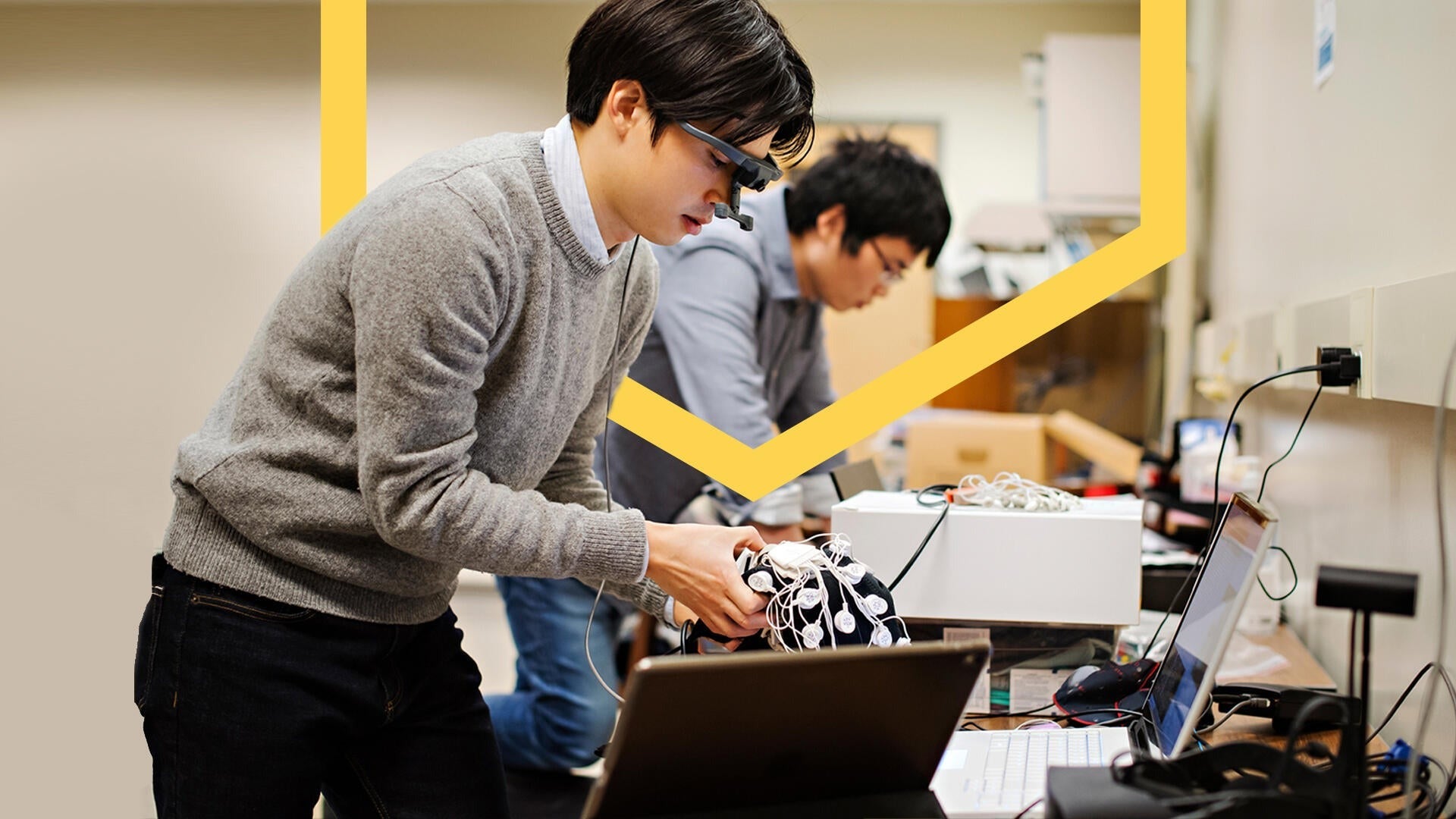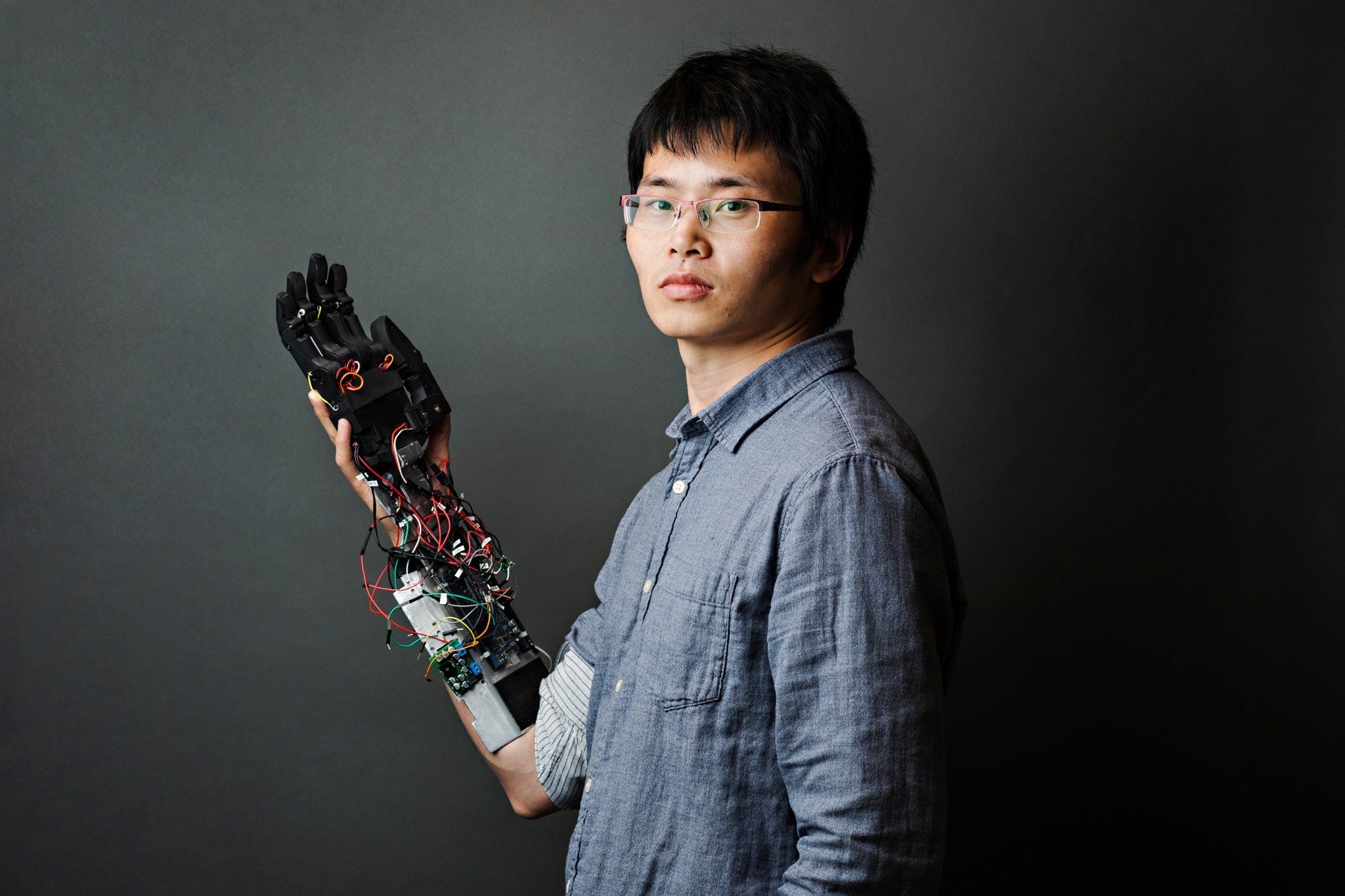Editor:
Brandon Sweet
University Communications
bulletin@uwaterloo.ca
The University is closed, but remote activities continue

The snow began falling last night and is still coming down (sideways, when the wind picks up), and in response to the weather conditions, the University of Waterloo has closed its campuses today.
Environment Canada has included Waterloo in a blanket Winter Storm Warning that includes most of southwestern Ontario. This is the first time that the University has closed due to severe weather since February 2019.
According to the University's weather closing guidelines, the University and the affiliated and federated institutions of Waterloo will close "because of severe weather when normal operation would pose a significant danger to students and employees, or would prevent large numbers of them from coming to campus or returning safely to their homes."
The pivot to remote learning and work during the pandemic has meant a change in what "closed" actually means, however. According to an update from Vice-President, Academic & Provost James Rush circulated in February 2021, remote learning and working will continue during a severe weather campus closure.
"Ordinarily, our decision to close a campus in the event of severe weather means that classes are not held, meetings are cancelled and so on," the provost wrote last year. "Recognizing that the pandemic means that the majority of our work and learning is now happening remotely, these activities will continue."
"To be clear: a campus closure for severe weather relates only to the physical location and does not mean that all University business is suspended for the day," Rush wrote. "Work that can be done remotely should continue."
Only essential personnel should prepare to come to campus during severe weather closures, the provost's update stated. "If we do close a campus for severe weather, it means only people designated as essential for operations during a severe weather-related campus closure should come to campus. Essential roles during a severe weather closure are different than those identified as “essential” during the pandemic. You must check with your supervisor who will let you know whether you must attend the campus or not during a severe weather closure."
"As is normal in the event of a closure due to severe weather, department heads are responsible for assigning duties and making reasonable arrangements for the protection of such staff," Provost Rush wrote.
That said, there are some on-campus operational closures to report:
Bright Starts Co-operative Early Learning Centre will be closed today due to inclement weather.
"All W Store locations will be closed today," says a note from Print + Retail Solutions. "Customers with existing curbside pickup appointments can still pickup their order. Orders can also be picked up any day this week instead. W Print in South Campus Hall is closed, but W Print in the General Services Complex will be operating for any urgent print requests."
This list may be added to as the snow continues to accumulate today.
Today's Senate meeting will continue as previously scheduled at 3:30 p.m. today on Microsoft Teams.
In addition, the Student Life Centre and the Turnkey Desk are both open today.
For more information, read Waterloo’s weather and emergency closing guidelines. Please monitor the University's weather statement page for further details.
Register for the Safeguarding Science workshop
A message from the Office of Research.
Faculty members, staff (i.e., Research staff, Safety Office staff, Research Ethics staff, and Information Systems & Technology staff involved in research using biological, chemical, radiological, or nuclear materials or technology) and students are invited to join Public Safety Canada (PSC) for the Safeguarding science workshop.
This online workshop will take place on Thursday, January 27 (1:00 p.m. to 3:00 p.m.). Please register to receive a link to the event which be held on Microsoft Teams.
The purpose of the workshop is to provide information and guidance to Canadian researchers on possible threats to their research and how to mitigate them.
More information can be found on the Public Safety Canada Safeguarding Science website.
Survey for web conferencing platform review and consolidation project now available
A message from Information Systems & Technology (IST).
As part of the project to review and reduce the growing set of web conferencing platforms available at Waterloo to a smaller, more sustainable offering, the project team has launched a survey to gather feedback on web conferencing needs and functionality requirements.
The results of the survey will help determine which tools will be recommended and fully supported by Information Systems & Technology (IST). The survey is available through Qualtrics and will run from Monday, January 17 to Friday, January 28.
Any questions or concerns about the survey, or the project in general, can be submitted to the project manager, Tara Hillis.
The name of the game is neurotech

By Melanie Scott. This article was originally published on Waterloo News.

Ning Jiang has an early memory of visiting the hospital where his parents worked in China and seeing someone walking with the aid of a prosthetic. This experience and others he had as the son of two physicians, led Jiang to begin thinking how technology could be used for good. A professor in the Department of Systems Design Engineering, Jiang is fascinated with devices and technology that can enhance human health and the way people experience the world around them.
Jiang is also the founder and director of the Waterloo Engineering Bionics Lab, where new interfaces and technologies that augment human capabilities are designed and tested.
“My goal is to develop technologies that are easier to use and more accessible, technologies that will allow people to better interact with the external world, especially when there is a medical need but also for productivity and entertainment purposes.”
Advancing technology at the bionics lab
Operating since 2015, research at the Waterloo Engineering Bionics Lab has focused mainly on building assistive and rehabilitation devices for persons with disabilities, such as upper-limb prosthetics or brain-controlled devices that aid stroke victims’ recovery. Research is also being done in other areas, such as health monitoring, a field of study in which devices provide feedback and data on human cardiac and cognitive stress levels and other measurements.
The bionics lab researches non-invasive neuro-signals that can enhance the performance of human-machine interactions. During these interactions, a brain-computer interface (BCI) extracts signals from the brain and immediately communicates to the technology so that it behaves exactly as the user intended. For example, a stroke patient or someone with spinal cord injuries may not be able to move their hands or legs. But the interface translates signals from the patient’s brain into a machine such as an exoskeleton, allowing the patient’s hands or legs to move.
Another example is patients with amputations. Using EMG signals from contracting muscles, the technology decodes the patient’s intention, such as moving a finger, and transmits the results to the prosthetic hand, which then moves exactly as the patient intended. The advantage of using these types of signals is that the technology can easily interpret human intentions. Prosthetics of this type are smoother and more intuitive for patients than typical prosthetics, which only use one set of muscles and require the patient to learn to control those muscles independently.
An entrepreneurial endeavour
The development of this neurotechnology led to the founding of the first company out of the Engineering Bionics Lab in 2018. Brink Bionics was founded by Ning Jiang, along with co-researchers Jiayuan He and Erik Lloyd (MASc ’19). It began as a bionic arm company, winning the Velocity Fund Pitch Competition, and has leveraged entrepreneurial support offered by the Velocity incubator. The company has since pivoted to use neurotechnology for gaming, filling a gap in the market left by conventional gaming controllers. Their commercial product, the Impulse Neurocontroller, allows for faster reaction time. The device, which is worn like a glove, uses sensors to interpret the movement intentions of the player before they move, allowing for reaction time that is up to 80 milliseconds faster than mouse-click actions. This increased reaction time provides significant advantages for gamers.
"During my time in the Engineering Bionics Lab, I was encouraged to pursue neurotechnology research that had the potential to impact lives beyond the conventional goals of scientific publications,” says Lloyd, CEO of Brink Bionics.
“Because of this entrepreneurial attitude, as well as the engineering resources and support made available by the University of Waterloo, we founded Brink Bionics. To date, we have raised close to $500,000 in funding from pitch competitions and venture capital, and launched our first neurotechnology product. We are now in another VC fundraising round to build out the next version of our gaming gear for neuro-enhancement.
“The company continues to be a means for our team to explore big ideas, as we are developing both implanted and wearable neural interface technologies that will augment the way we interface with devices in every aspect of our lives."

Researcher and Brink Bionics co-founder and CTO, Jiayuan He holds a smart prosthetic prototype, designed in the Engineering Bionics Lab.
The future of bionics
Jiang says filling medical and health-care needs is still the main direction for the Waterloo Engineering Bionics Lab, which partners with Grand River Hospital, McMaster University and the University of Toronto to conduct trials with patients.
Jiang remembers watching Robocop when he was a kid, a science fiction movie that left questions in his mind about the way technology can be used as a force for good or evil. He believes we will see a shift in the next few years in which bionics becomes a regular part of our lives and people increasingly incorporate biotechnologies into their bodies to enhance capabilities.
“Right now, things like electronic implants are more in the fringe or subculture of society,” he says. But humans will be integrating more technology and bio-machinery to enhance their functions in the near future. There is a lot of research happening in these areas and advances are being made at a fast pace.”
Senate meets today and other notes
The University of Waterloo's Senate has its first meeting of 2022 today at 3:30 p.m. on Microsoft Teams. Among the agenda items:
- A motion approve the addition of a regular online/virtual classroom in the part-time stream of the Master of Taxation (MTax) program, effective 1 May 2022;
- A motion to approve making the Graduate Studies Internship milestone optional, rather than required, for the MASc in Industrial and Organizational Psychology, effective 1 May 2022;
- A motion to approve the addition of a Ph.D. in Sustainability Management - Water program, effective 1 May 2022; and
- A motion to approve changes to the honours computational mathematics and the computational mathematics minor academic plan, effective 1 September 2022.
President and Vice-Chancellor Vivek Goel will deliver a 2020-2025 Strategic Plan Thematic Spotlights on Talent presentation to Senate as part of his presidential report, and Senate will discuss the terms of reference for the Senate Governance Review, which will be undertaken by the Senate Executive Committee this year.
The Senate agenda is available online on the Secretariat website.

"Applications for Speak Like a Scholar are open today," says a note from the Writing and Communication Centre (WCC). "This six-week program is designed to help Master's and PhD students develop their professional scholarly voices and give effective academic presentations with confidence. Applications are due January 27."
The Centre for Teaching Excellence (CTE) is sending out a reminder about some important upcoming deadlines:
- Consultations with CTE staff regarding the next round of LITE grants must be completed by Monday, January 24.
- The Call for Proposals deadline for the 2022 Waterloo Teaching and Learning Conference is Wednesday, January 26.
- The deadline for the Distinguished Teacher Award nominations and for the Amit and Meena Chakma Award for Teaching by a Student is Friday, February 4.
Here is a list of recent and upcoming thesis defences:
Geography and Environmental Management. Amir Chegoonian, “Remote sensing of chlorophyll-a in small inland waters”. Supervisors, Claude Duguay and Kiana Zolfaghari. Available upon request from the Faculty of Environment, Administrator, Graduate Studies. Oral defence Friday, January 7, 9:00 a.m.
School of Accounting and Finance. Karen Pinto, "The Valuation of Economic Earnings and Income Shifting of U. S. Multinationals in Domestic and Foreign Jurisdictions." Supervisor, Ken Klassen. Available upon request from the Faculty of Arts, Graduate Studies and Research Officer. Oral defence Friday, January 28, 1:00 p.m.
Environment, Resources & Sustainability. Parastoo Emami, “Rethinking Flood Risk Management”. Supervisor, Rob de Loë. Available upon request from the Faculty of Environment, Administrator, Graduate Studies. Oral defence Friday, January 28, 1:30 p.m.
Recreation and Leisure Studies. David Drewery, "Perceived Emotional Synchrony in Virtual Watch Parties." Supervisor, Ron McCarville. Email Faculty of Health Graduate Administration for a copy. Oral defence Friday, January 28, 11:00 a.m.
Link of the day
Betty White would have been 100
When and Where to get support
Students can visit the Student Success Office online for supports including academic development, international student resources, immigration consulting, leadership development, exchange and study abroad, and opportunities to get involved.
Finance and Student Financial Services will be closed to in-person service in EC5 until further notice. Students, please visit the Centre in Needles Hall or contact Student Financial Services at the helpdesk.
Instructors looking for targeted support for developing online components for blended learning courses, transitioning remote to fully online courses, revising current online courses, and more please visit Agile Development | Centre for Extended Learning | University of Waterloo (uwaterloo.ca).
Instructors can visit the Keep Learning website to get support on adapting their teaching and learning plans for an online environment.
Course templates are available within your course in LEARN to help you build and edit your content and assignment pages quickly.
The following workshops, webinars, and events are offered by the KL team (CTE, CEL, ITMS, LIB):
- Independent Remote Course Design Essentials, self-directed, continuous self-enrollment course in LEARN.
- Independent Blended Course Design (iBlend), self-directed, ongoing
- Copyright Overview for Waterloo Instructors and Staff - self-directed, continuous self-enrollment course in LEARN.
Employees can access resources to help them work remotely, including managing University records and privacy of personal information. Here are some tips for staying healthy while working from home.
Stay informed about COVID cases on campus by consulting the COVID case tracker.
The Writing and Communication Centre has virtual services and programs to help undergrads, grad students, postdocs and faculty members with academic writing.
- Meet with writing advisors in one-to-one appointments to brainstorm, draft, revise, and polish. No time for an appointment? Try email tutoring for undergrads.
- Beat isolation and make writing progress at weekly Virtual Writing Cafés for grad students and faculty or PJ-Friendly Writing Groups for Undergrads.
- Take an online workshop or apply to our popular Dissertation Boot Camp program.
- Faculty can request custom in-class workshops for their courses, or the WCC can facilitate any existing workshops for student groups.
- Course-integrated support available. Attention faculty and instructors: The application form for Writing and Communication Centre course-integrated support is now available online. We offer five unique support streams for your courses including synchronous and asynchronous workshops and monitored discussion boards.
Co-op students can get help finding a job and find supports to successfully work remotely, develop new skills, access wellness and career information, and contact a co-op or career advisor.
The Centre for Career Action (CCA) is currently offering virtual services only. Questions about CCA's services? Live chat or call 519-888-4047 between 8:30 a.m. and 4:30 p.m. EST, Monday to Friday.
Drop-in to Warrior Virtual Study Halls on Wednesdays from 5:30 p.m. to 7:00 p.m. Come together in this virtual space to set goals and work independently or in groups each week.
Renison's English Language Institute continues to offer virtual events and workshops to help students practice their English language skills.
If you feel overwhelmed or anxious and need to talk to somebody, please contact the University’s Campus Wellness services, either Health Services or Counselling Services. You can also contact the University's Centre for Mental Health Research and Treatment. Good2Talk is a post-secondary student helpline available to all students.
The Library will continue to focus on digital resources and consultations as we start winter term with classes primarily online, though spaces will be open for drop-in individual study space, bookable individual study rooms, drop-in access to computers and printers, book pick-up services and IST Help Desk support. Special Collections & Archives and the Geospatial Centre will be accessible by appointment. Full details on current services and hours are available on the Library’s COVID-19 Update webpage.
The Faculty Association of the University of Waterloo (FAUW) continues to advocate for its members. Check out the FAUW blog for more information.
The University of Waterloo Staff Association (UWSA) continues to advocate for its members. Check out the UWSA blog for more information.
The Sexual Violence Prevention and Response Office (SVPRO) supports all members of the University of Waterloo campus community who have experienced, or been impacted, by sexual violence. This includes all students, staff, faculty and visitors on the main campus, the satellite campuses, and at the affiliated and federated Waterloo Institutes and Colleges. For support, email: svpro@uwaterloo.ca or visit the SVPRO website.
The Office of Indigenous Relations is a central hub that provides guidance, support, and resources to all Indigenous and non-Indigenous campus community members and oversees the University's Indigenization strategy.
The Waterloo Indigenous Student Centre, based at St. Paul’s University College, provides support and resources for Indigenous students, and educational outreach programs for the broader community, including lectures, and events.
WUSA supports for students:
Peer support - MATES, Glow Centre, RAISE, Women’s Centre - Visit https://wusa.ca/peersupport to book an appointment either in person or online for the Fall term.
Food Support Service food hampers are currently available from the Turnkey Desk 24/7 in the Student Life Centre. Drop off locations are also open again in SLC, DC, DP, SCH and all residences.
Co-op Connection all available online. Check https://wusa.ca for more details.
Centre for Academic Policy Support - CAPS is here to assist Waterloo undergraduates throughout their experience in navigating academic policy in the instances of filing petitions, grievances and appeals. Please contact them at caps@wusa.ca. More information is available.
WUSA Student Legal Protection Program- Seeking legal counsel can be intimidating, especially if it’s your first time facing a legal issue. The legal assistance helpline provides quick access to legal advice in any area of law, including criminal. Just call 1-833-202-4571.
Empower Me is a confidential mental health and wellness service that connects students with qualified counsellors 24/7. They can be reached at 1-833-628-5589.
GSA-UW supports for graduate students:
The Graduate Student Association (GSA-UW) supports students’ academic and social experience and promotes their well-being.
Advising and Support - The GSA advises graduate students experiencing challenges and can help with navigating university policies & filing a grievance, appeal, or petition.
Mental Health covered by the Health Plan - The GSA Health Plan now has an 80 per cent coverage rate (up to $800/year) for Mental Health Practitioners. Your plan includes coverage for psychologists, registered social workers, psychotherapists, and clinical counsellors.
Dental Care - The GSA Dental Plan covers 60 per cent to 70 per cent of your dental costs and by visiting dental professionals who are members of the Studentcare Networks, you can receive an additional 20 per cent to 30 per cent coverage.
Student Legal Protection Program - Your GSA fees give you access to unlimited legal advice, accessible via a toll-free helpline: +1-833-202-4571. This advice covers topics including housing disputes, employment disputes, and disputes with an academic institution.
The Graduate House: Open Monday to Friday 11:30 a.m. - 6:00 p.m. The Graduate House is an essential component of graduate student life, and we're working hard to make it available to students. The quality food with local ingredients you love is available for takeaway. And graduate students who paid their fees can still get discounts and free coffee.
BIPOC Student Collective - The Collective is a safe space for BIPOC LGBTQ2+ students and aims to foster intergenerational and peer-to-peer support and mentorship. Join the online Discord channel for solidary chats and drop-in sessions.
When and Where (but mostly when)
Warriors vs. Laurier Blood Donation Battle. Join our “Waterloo Warriors” team on the Blood.ca website or app. #ItsInYouToGive
Healthy Warriors at Home, free online programs including Nutrition Guides, Personal Training Consults, Health Webinars, Mindfulness Courses and On-demand Fitness. Sign up now.
Warrior Rec Live Fitness Classes, free classes Monday to Thursday with a valid Warrior Rec membership. Barre, Yoga, Zumba, Warrior Workout, Boxing and more. Register now.
University Senate meeting, Monday, January 17, 3:30 p.m., Microsoft Teams.
Quantum Nano Collision Seminar Series: Professor Kevin Musselman, Wednesday, January 19, 4:00 p.m. to 5:00 p.m.
CrySP Speaker Series on Privacy featuring Sarah Lamdan, CUNY School of Law, “Data Analytics Companies in Academia,” Wednesday, January 19, 1:30 p.m., on Zoom.
WaterTalk: Harnessing 'Omics to Inform Strategies to Mitigate the Spread of Antimicrobial Resistance as a One Water Challenge, presented by Amy Pruden, Thursday, January 20, 10:30 a.m.
GreenHouse Transportation Hack for Health, Friday, January 21 to Saturday, January 22, Virtual Event and Pitch Competition, details and registration information can be found on the event page.
WaterLeadership: Media 101 - Tips for Engaging with the Media, presented by Pamela Smyth. Tuesday, January 25, 1:00 p.m.